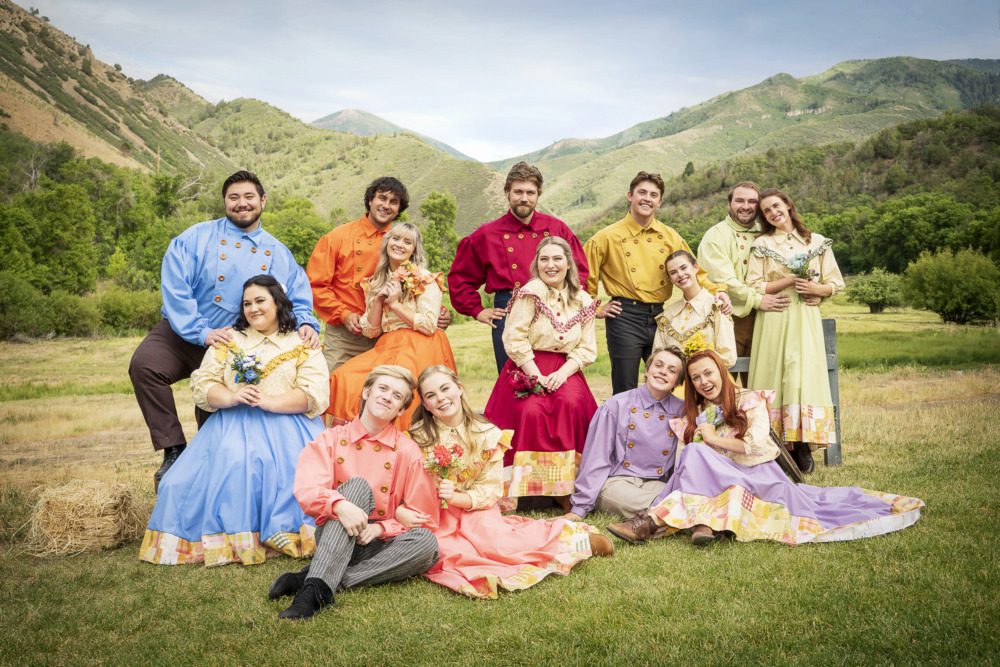OREM — The popularity of Seven Brides for Seven Brothers baffles me. The score (with music by Gene de Paul, lyrics by Johnny Mercer, and additional songs by Al Kasha and Joel Hirschhorn) is 1950s musical theatre pabulum. More importantly, the script (by Lawrence Kasha and David Landay) has aged poorly. But the current production at the show is still a crowd pleaser. The SCERA audience laughed at the jokes and vigorously applauded the musical numbers. People love this show.

Based on the 1954 film of the same name (which was, in turn, based on a story by Stephen Vincent Benet), Seven Brides for Seven Brothers tells the story of the Pontipee brothers, who live in the frontier mountains of Oregon. After oldest brother Adam gets married, his wife starts civilizing the brothers. Soon, they also want wives, and—inspired by the story of the abduction of the Sabine women—the six younger brothers kidnap their preferred women. A convenient avalanche traps them in the mountains, but the brothers’ marriage plans are disrupted when Milly separates the men from the women.
Director Michael Carrasco deserves most of the credit for the production’s success. Carrasco created several genuinely funny moments of stage business, such as when Milly collected the brothers’ soiled clothing, and the townspeople’s reactions during the barn raising. I also appreciated the care that Carrasco invested in staging the Adam-Milly relationship. Their reconciliation scene was a particularly nice moment in the second act that gave the show its heart.

Choreographing an amateur musical is often challenging because the dancing needs to look complex and interesting, but the steps also need to be within the range of ability of the cast (many of whom often have little or no formal training in dance). Choreographer Chantelle Wells balanced these needs well by creating lovely dances that drew on musical theatre steps, but with some ballet flourishes. This gave “Wonderful Day” and “Spring Dance” a light, airy feeling that matched the songs’ theme of falling in love. The “Cut-in Dance” was a boisterous romp, and it was fun to watch the different ways the brothers and the male townspeople would switch off dancing with the women.
Duncan Johnson plays Adam, the oldest Pontipee brother, as an affable, non-threatening frontiersman. His rendition of “Bless Your Beautiful Hide” is confident, but Johnson can also make Adam show fraternal love, especially in “Love Never Goes Away.”
Alyssa Baumgarten showcases Milly’s practical, down-to-earth nature. Baumgarten makes “I Married Seven Brothers” into a recognition of reality, as she putters around the stage, doing housework as she sings. “Glad That You Were Born” was another highlight from Baumgarten’s performance because of the tenderness it revealed in the character.

Although the play promises seven love stories, the script mostly focuses on Adam and Milly. Johnson and Baumgarten were a sweet couple, though I wish that Milly had shown more anger when Adam got angered enough to leave the group for the winter. Still, the progression from total strangers to loving husband and wife is a satisfying one to watch, and both actors are well suited to showing how their characters grow and change over time.
Kelsey Seaver‘s costumes are a delight. The seven couples were color-coded so that a brother’s shirt matched his future wife’s skirt. Subtle? No. Effective? Yes. Seaver also created nice townsperson costumes that contributed greatly to the show’s frontier feel.

Even though I dislike Seven Brides for Seven Brothers, I am compelled to admit that the SCERA has a fine production on stage. Seven Brides is still Seven Brides, and this production will not change anyone’s mind about the show. I could babble on about the play’s backward views about women, but it would not matter. People who care about such things are never going to buy a ticket to Seven Brides for Seven Brothers. And the show’s target audience does not care about a critic’s analysis of its message.
Suffice it to say that fans of the film enjoy this production of Seven Brides for Seven Brothers, and I hope that the audience finds many reminders of why they love this story.
[box]Seven Brides for Seven Brothers plays nightly (except Sundays and Wednesdays) at 8 PM at the SCERA Shell Outdoor Theatre (600 South 400 East, Orem) through August 14. Tickets are $10-20. For more information, visit scera.org.[/box]

